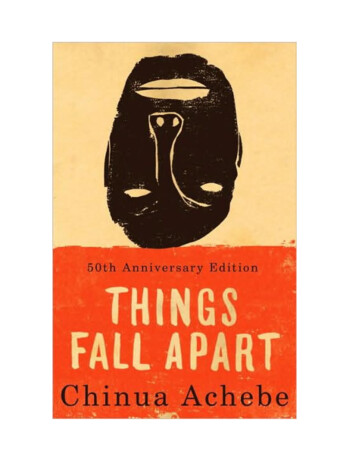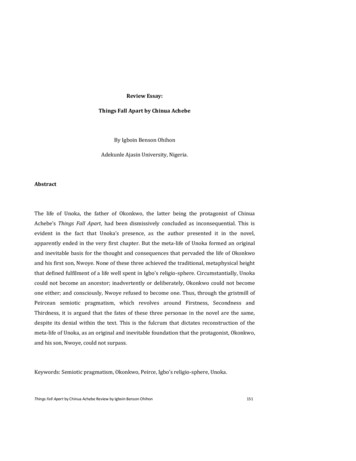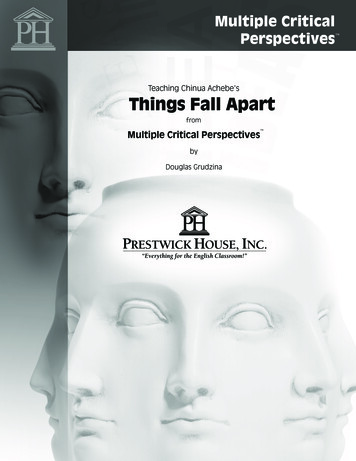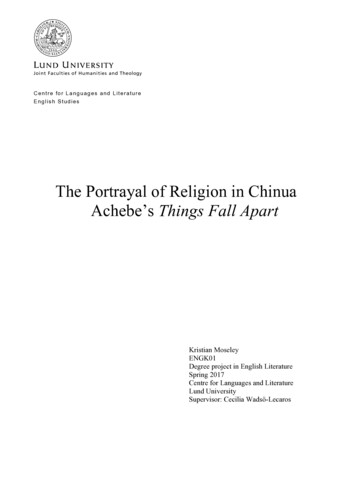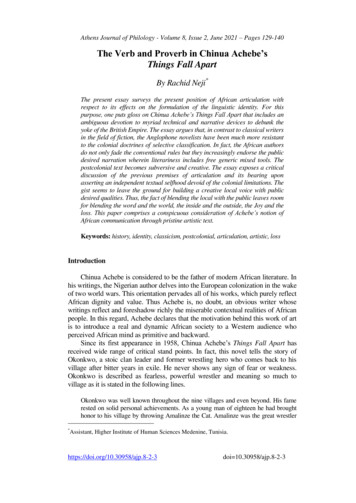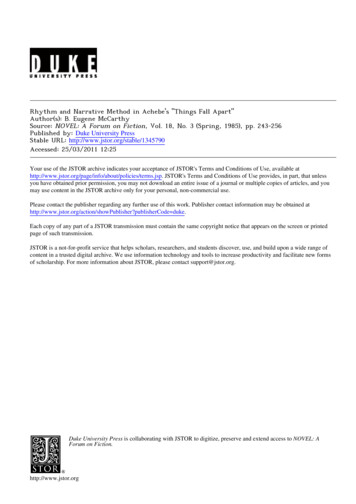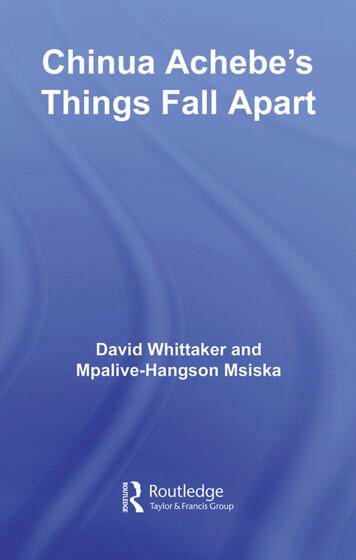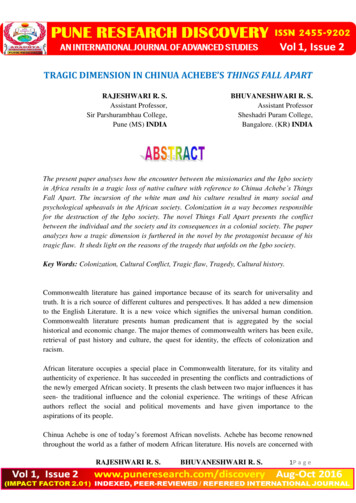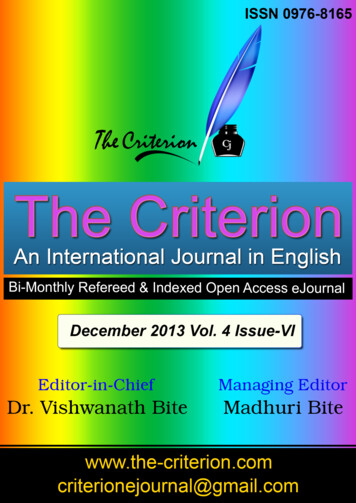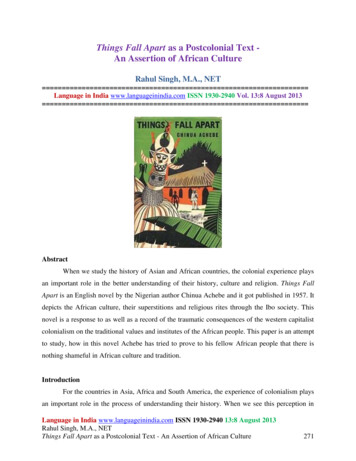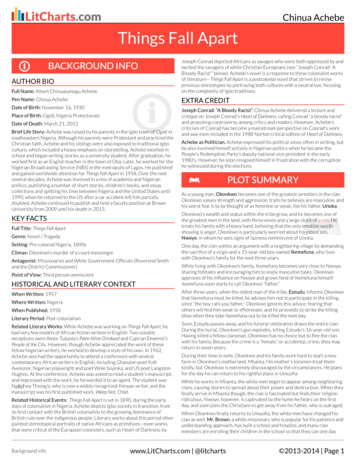
Transcription
Chinua AchebeThings Fall ApartFull Name: Albert Chinualumogu AchebeJoseph Conrad depicted Africans as savages who were both oppressed by andexcited the savagery of white Christian Europeans (see “Joseph Conrad: ‘ABloody Racist'” below). Achebe's novel is a response to these colonialist worksof literature—Things Fall Apart is a postcolonial novel that strives to reviseprevious stereotypes by portraying both cultures with a neutral eye, focusingon the complexity of Igbo traditions.Pen Name: Chinua AchebeEXTRA CREDITBABACKCKGRGROUNDOUND INFOAUTHOR BIODate of Birth: November 16, 1930Place of Birth: Ogidi, Nigeria ProtectorateDate of Death: March 21, 2013Brief Life Story: Achebe was raised by his parents in the Igbo town of Ogidi insoutheastern Nigeria. Although his parents were Protestant and practiced theChristian faith, Achebe and his siblings were also exposed to traditional Igboculture, which included a heavy emphasis on storytelling. Achebe excelled inschool and began writing stories as a university student. After graduation, heworked first as an English teacher in the town of Oba. Later, he worked for theNigerian Broadcasting Service (NBS) in the metropolis of Lagos. He publishedand gained worldwide attention for Things Fall Apart in 1958. Over the nextseveral decades, Achebe was involved in a mix of academia and Nigerianpolitics, publishing a number of short stories, children's books, and essaycollections and splitting his time between Nigeria and the United States until1990, when he returned to the US after a car accident left him partiallydisabled. Achebe continued to publish and held a faculty position at BrownUniversity from 2009 until his death in 2013.KEY FACTSFull Title: Things Fall ApartGenre: Novel / TragedySetting: Pre-colonial Nigeria, 1890sClimax: Okonkwo's murder of a court messengerAntagonist: Missionaries and White Government Officials (Reverend Smithand the District Commissioner)Point of View: Third person omniscientHISTORICAL AND LITERARY CONTEXTAchebe as Politician. Achebe expressed his political views often in writing, buthe also involved himself actively in Nigerian politics when he became thePeople's Redemption Party's deputy national vice-president in the early1980's. However, he soon resigned himself in frustration with the corruptionhe witnessed during the elections.PLPLOOT SUMMARYAs a young man, Okonkwo becomes one of the greatest wrestlers in the clan.Okonkwo values strength and aggression, traits he believes are masculine, andhis worst fear is to be thought of as feminine or weak, like his father, Unoka.Okonkwo's wealth and status within the tribe grow, and he becomes one ofthe greatest men in the land, with three wives and a large stock of yams. Hetreats his family with a heavy hand, believing that the only emotion worthshowing is anger. Okonkwo is particularly worried about his eldest son,Nwoye, in whom he sees signs of laziness reminiscent of Unoka.One day, the clan settles an argument with a neighboring village by demandingthe sacrifice of a virgin and a 15-year-old boy named Ikemefuna, who liveswith Okonkwo's family for the next three years.While living with Okonkwo's family, Ikemefuna becomes very close to Nwoye,sharing folktales and encouraging him to enjoy masculine tasks. Okonkwoapproves of his influence on Nwoye and grows fond of Ikemefuna himself.Ikemefuna soon starts to call Okonkwo “father.”After three years, when the oldest man of the tribe, Ezeudu, informs Okonkwothat Ikemefuna must be killed, he advises him not to participate in the killing,since “the boy calls you father.” Okonkwo ignores this advice, fearing thatothers will find him weak or effeminate, and he proceeds to strike the killingblow when they take Ikemefuna out to be killed the next day.When Written: 1957Where Written: NigeriaWhen Published: 1958Literary Period: Post-colonialismRelated Literary Works: While Achebe was working on Things Fall Apart, hehad very few models of African fiction written in English. Two notableexceptions were Amos Tutuola's Palm-Wine Drinkard and Cyprian Ekwensi'sPeople of the City. However, though Achebe appreciated the work of thesefellow Nigerian writers, he worked to develop a style of his own. In 1962,Achebe also had the opportunity to attend a conference with severalcontemporary African writers in English, including Ghanaian poet KofiAwoonor, Nigerian playwright and poet Wole Soyinka, and US poet LangstonHughes. At the conference, Achebe was asked to read a student's manuscript,and impressed with the work, he forwarded it to an agent. The student wasNgũgĩ wa Thiong'o, who is now a widely recognized Kenyan writer, and themanuscript was his first published work, Weep Not, Child.Related Historical Events: Things Fall Apart is set in 1890, during the earlydays of colonialism in Nigeria. Achebe depicts Igbo society in transition, fromits first contact with the British colonialists to the growing dominance ofBritish rule over the indigenous people. Literary works about this period oftenpainted stereotypical portraits of native Africans as primitives—even worksthat were critical of the European colonizers, such as Heart of Darkness byBackground infoJoseph Conrad: “A Bloody Racist”. Chinua Achebe delivered a lecture andcritique on Joseph Conrad's Heart of Darkness, calling Conrad “a bloody racist”and provoking controversy among critics and readers. However, Achebe'scriticism of Conrad has become a mainstream perspective on Conrad's workand was even included in the 1988 Norton critical edition of Heart of Darkness.Soon, Ezeudu passes away, and his funeral celebration draws the entire clan.During the burial, Okonkwo's gun explodes, killing Ezeudu's 16-year-old son.Having killed a fellow clansman, Okonkwo has no choice but to flee the clanwith his family. Because the crime is a “female,” or accidental, crime, they mayreturn in seven years.During their time in exile, Okonkwo and his family work hard to start a newfarm in Okonkwo's motherland, Mbanta. His mother's kinsmen treat themkindly, but Okonkwo is extremely discouraged by the circumstances. He plansfor the day he can return to his rightful place in Umuofia.While he works in Mbanta, the white men begin to appear among neighboringclans, causing stories to spread about their power and destruction. When theyfinally arrive in Mbanta though, the clan is fascinated but finds their religionridiculous. Nwoye, however, is captivated by the hymn he hears on the firstday, and soon joins the Christians to get away from his father, who is outraged.When Okonkwo finally returns to Umuofia, the white men have changed hisclan as well. Mr. Brown, a white missionary who is popular for his patience andunderstanding approach, has built a school and hospital, and many clanmembers are enrolling their children in the school so that they can one daywww.LitCharts.com @litcharts 2013-2014 Page 1
Things Fall Apartbecome clerks or teachers. However, soon after Okonkwo's return, Mr. Brownleaves the country due to health reasons, and Reverend Smith replaces him.been born a son. Ezinma also shares a close relationship with her mother, whoconsiders Ezinma to be a companion as well as a daughter.Reverend Smith is uncompromising, encouraging acts among the convertedclan members that provoke the rest of the clan. When Enoch, a fanaticalconvert, rips the mask off of one of the clan's masked egwugwu during aceremony. The clan retaliates by burning down the church. Reverend Smithreports this transgression, and the District Commissioner tricks the clan'sleaders into meeting with him before handcuffing them. The clan leaders,including Okonkwo, suffer insults and beatings before they are released oncethe village pays the fine.MrMr. Brown – Mr. Brown, the first white missionary to travel to Umuofia,institutes a policy of respect and compromise between the church and theclansmen. He engages in long religious discussions with Akunna in order tounderstand the Igbo traditions, and he builds a school and a hospital inUmuofia. Unlike Reverend Smith who arrives later, Mr. Brown avoidsresorting to violence and harsh methods of enforcing church beliefs,attempting to use his understanding of the Igbo faith to convert clansmen.The morning after their release, the clan leaders speak of war before they areinterrupted by the arrival of court messengers. Full of hate, Okonkwoconfronts the leader, who says that the white man commands the meeting tostop. In a flash, Okonkwo strikes down the messenger with his machete.Seeing that none of his clansmen support him in his violent action, Okonkwowalks away and hangs himself.When the District Commissioner comes to fetch Okonkwo the next day, theclansmen lead him to his hanging body instead, saying that they cannot touchit, since it's an abomination for a man to take his own life. The DistrictCommissioner finds this custom interesting, making note of it for his book onNigeria, which he plans to title The Pacification of the Primitive Tribes of theLower Niger.CHARACHARACTERSCTERSOkOkonkwoonkwo – The novel's main character and an influential clan leader,Okonkwo fears becoming an unsuccessful, weak man like his father, Unoka. Asa result, Okonkwo is hardworking and aggressive, traits that bring him fameand wealth at the beginning of the novel. This same fear also causes Okonkwoto be impatient and brash, however, leading to his eventual downfall when hecan't adjust to the changes occurring in the clan.Unoka – Unoka is Okonkwo's father. Though a talented musician in life, hewas also lazy and irresponsible, accumulating many debts. Unoka dies ashameful death, still in debt and without title. His death haunts Okonkwo, whovows to hate everything that his father loved, including gentleness andidleness.NwoNwoyye – Nwoye is Okonkwo's eldest son. Nwoye resembles his grandfatherUnoka, in that he's drawn to gentleness and music, even though he recognizesthat his father disapproves. This tension between Okonkwo and Nwoye leadsto an eventual split when Nwoye becomes one of the clan members who leavethe clan to join the Christians.IkIkemefunaemefuna – Ikemefuna is the ill-fated boy the Mbaino sacrifice to Umuofia inorder to prevent war. Ikemefuna is unaware that his father had a hand in killingone of the daughters of Umuofia and doesn't understand why he's taken awayfrom his mother and sister. He settles into Okonkwo's household for threeyears and comes to consider Okonkwo his true father. Nwoye looks up toIkemefuna, and the two become inseparable. At the end of three years, theclan decides that the boy must be killed, and Okonkwo deals the killing blow.Ogbuefi Ezeudo – Ezeudo is oldest man in the village and a great orator. Hewarns Okonkwo not to take part in the killing of Ikemefuna, but Okonkwopays no heed. Ezeudo passes away shortly afterwards, and Okonkwoaccidentally kills one of Ezeudo's sons when his gun splinters at Ezeudo'sburial. Okonkwo and his family are exiled for seven years.Obierika – Obierika is Okonkwo's close friend. He questions clan tradition attimes, choosing not to take part in the killing of Ikemefuna, for example, andwondering why Okonkwo's accidental crime should merit exile for sevenyears. He helps Okonkwo by selling his yams and visiting him in exile.Ekwefi – Ekwefi is Okonkwo's second wife and the mother of Ezinma. Oncethe village beauty, Ekwefi ran away from her first husband to live withOkonkwo. Ezinma is her only surviving child, and the two share a closerelationship. Having lost her first nine children to death in infancy, Ekwefi fearsthat she will lose Ezinma too.Ezinma – Ezinma is Okonkwo's eldest daughter and Ekwefi's only child tosurvive past infancy. Ezinma resembles her mother who was once the villagebeauty. She understands her father well, and he in turn wishes that she hadCharactersReRevverend James Smith – Reverend Smith replaces Mr. Brown after the latterdeparts for health reasons. Unlike Mr. Brown, Reverend Smith is impatient andstrict, showing no respect for indigenous customs or culture. He criticizes theway Mr. Brown interacted with the Umuofia people before his arrival, and heencourages extreme tactics to provoke change in the clan.Akunna – Akunna, a respected man of the clan, discusses religious beliefs withMr. Brown. During these discussions, Akunna brings up some strikingsimilarities between their methods of worship.District Commissioner – The District Commissioner shows up in Umuofiaafter Okonkwo murders a white man towards the end of the novel. TheDistrict Commissioner plans to write a book on his experiences in Nigeria, andthe title he chooses—The Pacification of the Primitive Tribes of the LowerNiger—reveals his superior attitude towards the Igbo people, whom he treatsas objects of study rather than as actual people with their own complexcustoms and beliefs.Uchendu – Uchendu is the younger brother of Okonkwo's mother. Uchenduattempts to reassure Okonkwo after he arrives with his family in Mbanta,advising him to be grateful for the comfort his motherland offers.Enoch – Enoch is a fanatical convert to the Christian church in Umuofia. WhileMr. Brown disapproves of Enoch's blatant disrespect for Igbo traditions,Reverend Smith encourages Enoch's provocative behavior.Chielo – Chielo is a widow who also serves as a priestess in Umuofia. She isdedicated to the Oracle of the goddess Agbala. Chielo is friends with Ekwefiand cares for Ezinma, whom she calls “my daughter.”Nwakibie – Nwakibie, a wealthy clansman, lends Okonkwo 800 seed-yamswhen Okonkwo is still young, helping him build the beginnings of his personalwealth and status. However, the year that Nwakibie lends Okonkwo the seedyams turns out to be the worst year for harvest in living memory.THEMESTRADITION VS. CHANGEThe novel's title is a quote from a poem by the Irish poet W.B. Yeats called"The Second Coming": "Things fall apart; the center cannot hold; / Mereanarchy is loosed upon the world.” Much of the novel centers on Umuofiatraditions of marriage, burial, and harvest. Achebe's decision to use a thirdperson narrator instead of writing the book from Okonkwo's perspectivedemonstrates just how central the idea of tradition is to the book, since thethird-person narrator can more objectively describe facets of Umuofiasociety—their love of proverbs or how they make judicial decisions, forexample—to the reader than Okonkwo could as an insider to these rituals. Asthe quote in the epigraph suggests, though, these traditions that form thecenter of Umuofia society cannot survive in the face of major changesoccurring around them. As the white men enter the clans and impose theirworld order upon them, Umuofia society spirals apart.Okonkwo and his son Nwoye also symbolize tradition and change,respectively. Okonkwo's character represents tradition, since he holdsconventional ideas of rank, reputation, and masculinity in high esteem. As thebook progresses, however, Okonkwo begins to fall out of favor with the clans,and his descent signals the crumbling of traditional Umuofia society. Hisadherence to tradition also drives him to kill his own surrogate son,Ikemefuna, driving away Nwoye in the process. Nwoye feels cold when hecontemplates certain aspects of Umuofia society—such as leaving infant twinsout to die and the idea of sacrificing innocents like Ikemefuna—and this pusheshim to join the Christians when he's given the chance later in the novel.www.LitCharts.com @litcharts 2014 Page 2
Things Fall ApartFATE VS. FREE WILLFrom the start, Okonkwo's will seems to drive his ascent in Umuofia society.He rises from being the son of a debtor to being one of the leaders of the clan,thanks to his hard work and aggression. He becomes known for his wrestlingprowess, and we are told that this cannot be attributed to luck: “At the mostone could say that his chi or personal god was good. But the Ibo people have aproverb that when a man says yes his chi says yes also. Okonkwo said yes verystrongly; so his chi agreed.”However, once things start turning sour for Okonkwo, he begins to blame hisfate. This begins with Ikemefuna's death. Ikemefuna, along with the infanttwins of the novel, represent the most straightforward victims—they aren'tgiven a chance to act, but are instead acted upon violently. (“The ill-fated ladwas called Ikemefuna.”) Okonkwo blames the Oracle for his part in murderingIkemefuna, though it could be argued—and is argued by the clan's oldestmember, Ezeudu, and by Okonkwo's neighbor Obierika—that he had a choicein whether to take part or not. Later, when Okonkwo's gun splinters and heaccidentally kills one of Ezeudu's sons, Okonkwo faces exile. Although hiscrops do well in the neighboring clan and he is allowed to return in sevenyears, Okonkwo is completely discouraged by the experience, and we find areversal of the earlier quote: “A man could not rise beyond the destiny of hischi. The saying of the elders was not true—that if a man said yea his chi alsoaffirmed. Here was a man whose chi said nay despite his own affirmation.”LANGULANGUAAGELanguage is a vital part of Umuofia society. Strong orators like Ogbuefi Ezeugoare celebrated and given honorable burials. Because clan meetings are soimportant for organization and decision-making, these speakers play animportant role for society. Storytelling is also a form of education for theclan—whether they're masculine war stories or feminine fables, storytellingdefines different roles for clan members and moves them to action. Evenwestern religion takes hold because of story and song: when Nwoye firsthears a hymn, it marks the beginning of his transition from clan member toChristian.The white District Commissioner also notes the importance of language tothe Umuofia, but in a less generous light. When speaking with Obierika, hethinks: “One of the most infuriating habits of these people was their love ofsuperfluous words,” suggesting both the white men's condescension towardsthe Umuofia and how white language and culture will come to overtake that ofUmuofia. At the end of the novel, the District Commissioner mentions the titleof the book he plans to write about his experiences in Nigeria: The Pacificationof the Primitive Tribes of the Lower Niger. The District Commissioner's proposedtitle here is itself wordy and grandiose—i.e. superfluous. But whatdistinguishes it from the Umuofia language is that it's book-learned—and it willbe written down. The ability to read and write in English begins to representpower, as the white men provide more financial incentives for learning theirlanguage and more clan members choose to enroll in their schools.Achebe's decision to transcribe several words from the Igbo languagethroughout the novel takes back some of this power, however, by suggestingthat there are African ideas that cannot be adequately described in English.Achebe also uses repetition and idioms to create a more African style whilewriting in English. To add to this, what colonial rule and education unwittinglygave Nigerians was a common language with which to communicate with oneanother—by writing in English, Achebe is telling a story that people acrossNigeria can comprehend, and by shaping it to his purposes, Achebe is claimingwhat was originally imposed.MASCULINITYOkonkwo dedicates himself to being as masculine as possible, and through hisrise to become a powerful man of his tribe and subsequent fall both within thetribe and in the eyes of his son Nwoye, the novel explores the idea ofmasculinity. Okonkwo believes in traditional gender roles, and it pains him thathis son Nwoye is not more aggressive like he is. As a result, it's revealing thathe expresses the wish that his daughter Ezinma were a boy—from this weknow how fond he is of her. Additionally, in a meeting towards the verybeginning of the book, Okonkwo insults a man without title by calling him awoman, demonstrating how much masculinity is valued when ranking those inUmuofia society. Ultimately, though, Okonkwo's adherence to masculinity andSymbolsaggression leads to his fall in society—he becomes brittle and unable to bendwith the changes taking place in his clan. In keeping with this principle ofmasculinity, Okonkwo forces himself to kill his own surrogate son, murder thewhite man against his better judgment, and hang himself before a punishmentcan be imposed by others. Okonkwo's aggression makes him weak in theend—it leaves him with no room to maneuver against the more subtle ways ofthe white man.Nwoye struggles with this idea of masculinity, as he wants to please his fatherby being aggressive and traditional, but ultimately, he's repelled by theviolence in Umuofia rituals and joins the Christians. Nwoye's departure canalso be linked to this idea from Okonkwo's uncle, Uchendu, after the family isexiled from Umuofia: “'It's true that a child belongs to its father. But when afather beats his child, it seeks sympathy in its mother's hut.'” Likewise, afterbeing beaten by his father, Nwoye leaves to seek solace in the more feminineand seemingly gentle Christian religion.RELIGIONReligion is the main arena where both cultural differences and similarities playout at the end of the novel. Religion represents order in both societies, butthey manifest differently. While religion in Umuofia society is based onagriculture, religion is seen as education in the white man's world. As a result,the gods in Umuofia society are more fearsome, since clan members are at themercy of natural cycles for their livelihood. Mr. Brown, the white missionary,condemns this idea of fearing your god, but in fact the white man's religiontakes root using fear tactics as well. When clan members break certain laws ordisplease the white men, they're locked up, starved, and beaten.The dialogue between one of the clan leaders of a neighboring tribe, Akunna,and Mr. Brown reveals how much both systems of religion have in common.Akunna agrees, for example, that their wooden carvings of deities are justthat—wooden carvings—but he likens it to the figure of Mr. Brown: he's alsojust a conduit or symbol for the western God. Akunna expresses what thenarrator has already suggested—that the Umuofia people only pretend tobelieve in certain aspects of their religion, such as the masked gods who arereally tribe members wearing masks. This dialogue about religion does a lot tocarry out Achebe's mission of depicting Nigerian society as one that's far fromprimitive—depicting it instead as a culture with mythologies and rituals and anunderstanding of the mythologies behind those rituals. It's also one of themoments when more similarities than differences are stressed between thetwo cultures.Religion also returns us to the Yeats poem quoted in the epigraph. The poemuses plenty of ominous Biblical language in describing an apocalyptic scenario,which parallels the situation in the novel where religion is the vehicle for thefall of Umuofia society. Western religion breaks order in the Umuofia societyby taking in outcasts and clan members without title and giving them power.By taking power away from the clan's authorities, western religion destroysthe clan's old methods of justice and order, creating an apocalyptic scenariofor the clan's former way of life.SYMBOLSYAMSTowards the beginning of the novel, Achebe's narrator refers to yam as “theking of crops,” emphasizing both its importance in Umuofia society and itsmasculine status. The clan's year is divided according to the planting andharvesting of yams, and Okonkwo's mood and actions vary whether it's theWeek of Peace, the planting season, or the Feast of the New Yam. During theFeast of the New Yam, for example, Okonkwo grows restless with celebrationsand the lack of work, and his temper flares, creating an episode of violenceagainst Ekwefi. During the planting season, Okonkwo berates Ikemefuna andNwoye for mishandling the seed-yams, but he's actually the most contentduring this period of labor, since he can work tirelessly. Yams are laborintensive and considered a man's crop. Only men plant yams, and their abilityto support their family with their yam harvest is a sign of wealth and ability.www.LitCharts.com @litcharts 2014 Page 3
Things Fall ApartFIREOkonkwo and his fellow clansmen liken him to a “Roaring Flame”—aggressive,powerful, and strong-willed. For Okonkwo, these are all positive, masculinetraits, and he laments the fact that his son Nwoye doesn't possess the samefiery spirit. However, Okonkwo has a revelation in Chapter 17, as he gazes intothe fire after his son joins the Christians: “Living fire begets cold, impotentash.” He realizes that his aggression could foster the opposite in Nwoye, but henever makes the connection that fire eventually exhausts its source as well. Allof Okonkwo's impatience and aggression eventually lead to his owndestruction after a spectacular final flare of anger when he murders the whitemessenger.QUOQUOTESTESthat his father was agbala. That was how Okonkwo first came to knowthat agbala was not only another name for a woman, it could also mean a manwho had taken no title. And so Okonkwo was ruled by one passion – to hateeverything that his father Unoka had loved. One of those things wasgentleness and another was idleness.—NarratorCHAPTER 3Unoka was an ill-fated man. He had a bad chi or personal god, and evil fortunefollowed him to the grave, or rather to his death, for he had no grave. He diedof the swelling which was an abomination to the earth goddess.—NarratorCHAPTER 1[Okonkwo] had a slight stammer and whenever he was angry and could notget his words out quickly enough, he would use his fists.—NarratorAmong the Ibo the art of conversation is regarded very highly, and proverbsare the palm-oil with which words are eaten.—NarratorAge was respected among his people, but achievement was revered. As theelders said, if a child washed his hands he could eat with kings.—Narrator“Since I survived that year,” he always said, “I shall survive anything.” He put itdown to his inflexible will.—OkonkwoCHAPTER 4The man who had contradicted [Okonkwo] had no titles. That was why he hadcalled him a woman.—NarratorBut the Ibo people have a proverb that when a man says yes his chi says yesalso. Okonkwo said yes very strongly; so his chi agreed.—NarratorThe ill-fated lad was called Ikemefuna.—NarratorCHAPTER 2Dangerous animals became even more sinister and uncanny in the dark. Asnake was never called by its name at night, because it would hear. It wascalled a string.—Narrator [Okonkwo] was not afraid of war. He was a man of action, a man of war.Unlike his father he could stand the look of blood. In Umuofia's latest war hewas the first to bring home a human head.—NarratorAnd in fairness to Umuofia it should be recorded that it never went to warunless its case was clear and just and was accepted as such by its Oracle – theOracle of the Hills and the Caves. And there were indeed occasions when theOracle had forbidden Umuofia to wage a war. If the clan had disobeyed theOracle they would surely have been beaten, because their dreaded agadinwayi would never fight what the Ibo call a fight of blame.—NarratorOkonkwo did as the priest said. He also took with him a pot of palm-wine.Inwardly, he was repentant. But he was not the man to go about telling hisneighbors that he was in error. And so people said he had no respect for thegods of the clan.—NarratorYam stood for manliness, and he who could feed his family on yams from oneharvest to another was a very great man indeed.—NarratorCHAPTER 5The Feast of the New Yam was held every year before the harvest began, tohonor the earth goddess and the ancestral spirits of the clan.—NarratorCHAPTER 7Nwoye knew that it was right to be masculine and to be violent, but somehowhe still preferred the stories that his mother used to tell —NarratorEven as a little boy he had resented his father's failure and weakness, and evennow he still remembered how he had suffered when a playmate had told himQuoteswww.LitCharts.com @litcharts 2014 Page 4
Things Fall ApartAnd at last the locusts did descend. They settled on every tree and on everyblade of grass; they settled on the roofs and covered the bare ground. Mightytree branches broke away under them, and the whole country became thebrown-earth color of the vast, hungry swarm.—NarratorCHAPTER 14CHAPTER 8Ezinma took the dish in one hand and the empty water bowl in the other andwent back to her mother's hut. “She should have been a boy,” Okonkwo said tohimself again. His mind went back to Ikemefuna and he shivered.—Narrator“The world is large,” said Okonkwo. “I have even heard that in some tribes aman's children belong to his wife and her family.” “That cannot be,” said Machi.“You might as well say that the woman lies on top of the man when they aremaking the children.”—NarratorA man could not rise beyond the destiny of his chi. The saying of the elders wasnot true—that if a man said yea his chi also affirmed. Here was a man whose chisaid nay despite his own affirmation.—Narrator“It's true that a child belongs to its father. But when a father beats his child, itseeks sympathy in its mother's hut Is it right that you, Okonkwo, should bringto your mother a heavy face and refuse to be comforted? Be careful or youmay displease the dead.”—UchenduCHAPTER 15CHAPTER 10 even when it was said that a ceremony would begin “after the midday meal”everyone understood that it would begin a long time later, when the sun's heathad softened.—NarratorNo woman ever asked questions about the most powerful and the most secretcult in the clan.—Narrator“ I forgot to tell you another thing which the Oracle said. It said that otherwhite men were on their way. They were locusts, it said, and that first man wastheir harbinger sent to explore the terrain. And so they killed him.”—Obierika“Never kill a man who says nothing. Those men of Abame were fools. What didthey know about the man?”—UchenduCHAPTER 16CHAPTER 13It was a crime against the earth goddess to kill a clansman, and a man whocommitted
Things Fall Apart AUTHOR BIO Full Name:Albert Chinualumogu Achebe Pen Name:Chinua Achebe Date of Birth:November 16, 1930 Place of Birth:Ogidi, Nigeria Protectorate Date of Death:March 21, 2013 Brief Life Story:Achebe was raised by his parents in the Igbo town of Ogidi in southeastern Nigeri
